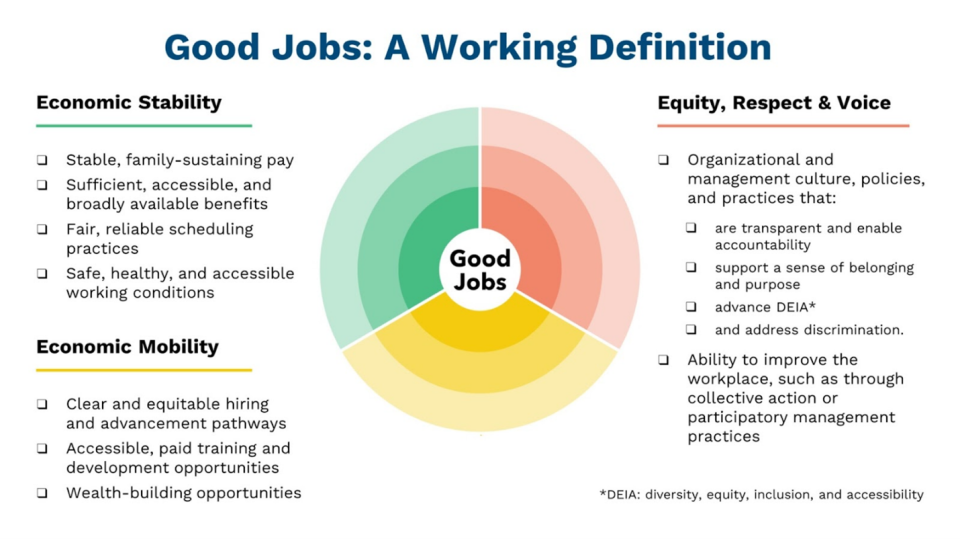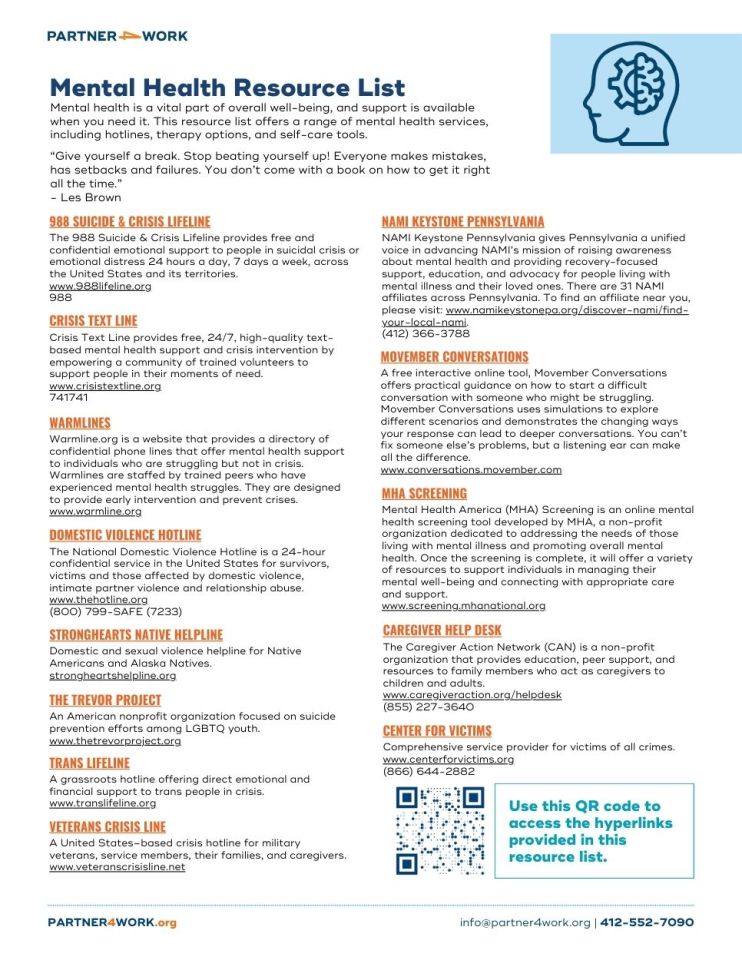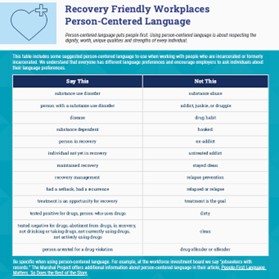Industry Solutions

Strategies that strengthen workplaces and allow businesses to thrive
“We have seen major outcomes through our partnership with Partner4Work, including reduced turnover, better retention, and improved culture. Our turnover rate for the Shorty’s X brand has dropped from 42% to 19%. We've consistently celebrated low turnover with Burgatory at 12%. Now with additional pipelines in our community, we're able to recruit talent from new areas, like local colleges and culinary programs.”
Alexis Bovalino, Human Resources Director, Burgatory and Shorty’s X
Good jobs are good for business. Employers of all sizes and across all industries have an opportunity to strengthen workplaces by implementing policies and practices that increase job quality. Businesses that offer good jobs are more competitive in attracting talent and benefit from increased retention, productivity, and innovation. A focus on good jobs can also help businesses achieve their DEI goals, provided businesses are intentional about engaging diverse worker voice in their definition of a good job.
Partner4Work is dedicated to supporting local employers interested in implementing good job strategies, including working directly with business leaders through industry partnerships, peer working groups, and one-on-one consulting.
For more information or to begin partnering in this work, contact Bonny Yeager, Senior Manager of Industry Solutions at byeager@partner4work.org or 412-745-0269.
What is a "Good Job"?
Good jobs provide economic stability and mobility to staff at all levels and build equity, respect, and voice within the workplace.
The Aspen Institute led a group of leaders in business, labor, workforce development, and policy to develop an evidence-based, shared definition of job quality¹. This definition provides a guide for action and a common language to discuss priorities. The definition is both foundational and aspirational — these job quality indicators are foundational to all good jobs in all sectors and all stages of a career with the aspiration of creating good jobs where all or most of these indicators are high.
Learn More See the Aspen Institute’s full Statement on Good Jobs and join more than 100 organizations that have signed on.
Ready to Take Action?
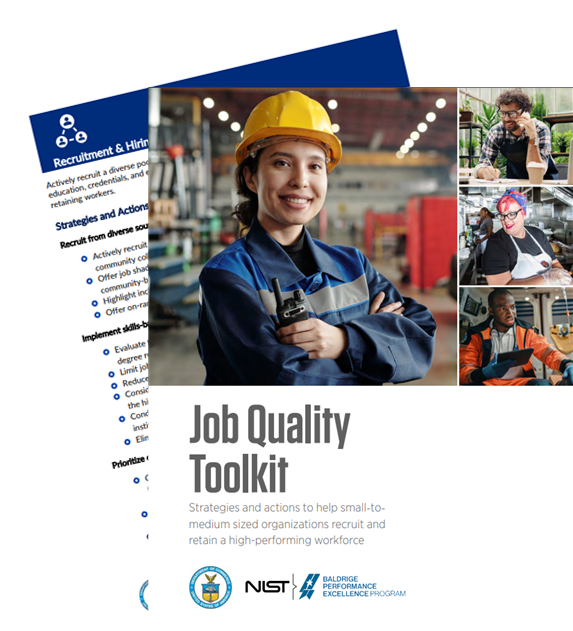
The Job Quality Toolkit², created jointly by the Departments of Commerce and Labor, offers practical guidance for implementing policies and practices around eight drivers of job quality:
- Recruitment and Hiring
- Benefits
- Diversity, Equity, Inclusion, and Accessibility
- Empowerment and Representation
- Job Security and Working Conditions
- Organizational Culture
- Pay
- Skills and Career Advancement
Download the full toolkit, which includes specific, actionable strategies within each of the 8 drivers of job quality, as well as case studies from organizations that have begun the work.
Making Jobs More Accessible
In the realities of today’s tight labor market, it is critical that we make jobs widely accessible. We are leaving valuable employees on the sidelines.
Family Supportive Workplaces
Parents and caregivers are a vital part of the workforce. In Allegheny County, working parents make up 25% of our labor force, and up to 16% of working individuals have children and no stay-at-home partner. Additionally, child care and eldercare responsibilities are keeping a significant number of people out of the labor market.

Employers with family supportive work cultures are better able to recruit and retain diverse talent, and they stand to gain significant advantages in positive branding, productivity, and growth³.
Learn more with our Family Supportive Workplaces Guide and connect staff to valuable resources using our Child Care & Family Resource List. Click the images below to download.
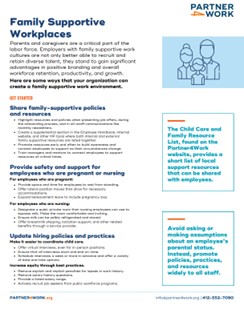 |
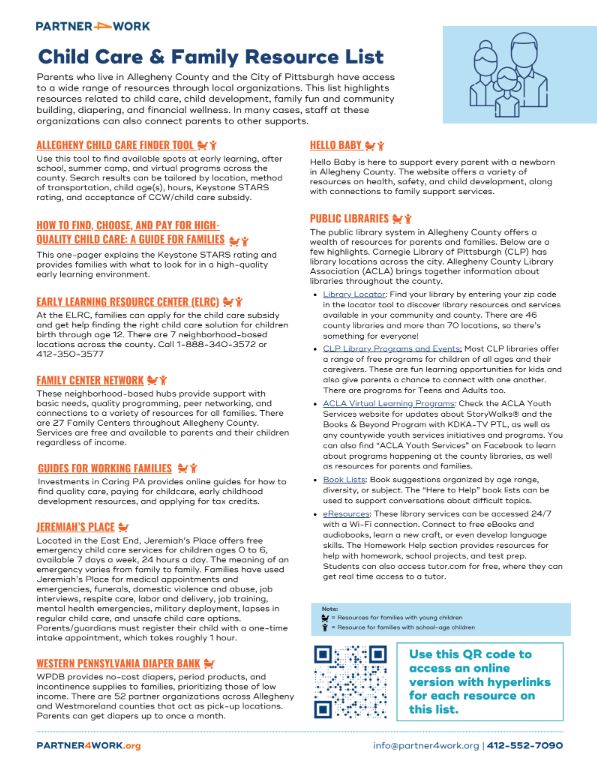 |
Mental Health Supportive Workplaces
Did you know that 76% of U.S. employees report at least one symptom of a mental health condition due to workplace stress? Supporting mental health at work is essential for improving job quality and overall well-being. This resource list provides both national and local hotlines, offering support for employees and employers alike. Prioritizing mental health is a vital step toward creating thriving, resilient workplaces.
https://www.mindsharepartners.org/mentalhealthatworkreport-2021
Recovery Friendly Workplaces
Employers who adopt Recovery Friendly Workplace practices can make a difference in the lives of their workers while decreasing costs associated with turnover, absenteeism, loss of productivity, and healthcare expenditures. Seventy-five percent of adults with untreated substance use disorder are in the workforce and 1 in 3 households are directly impacted by the disease4. Substance use disorder is a treatable disease and people in recovery are assets to the workforce.

Learn more with our Recovery Friendly Workplaces Guide, connect staff to valuable resources using our Recovery Resource List, and promote person-centered language in your workplace. Click the images below to download.
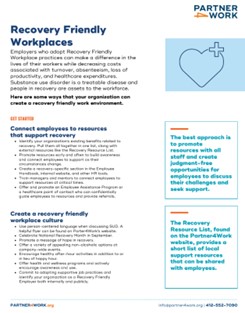 |
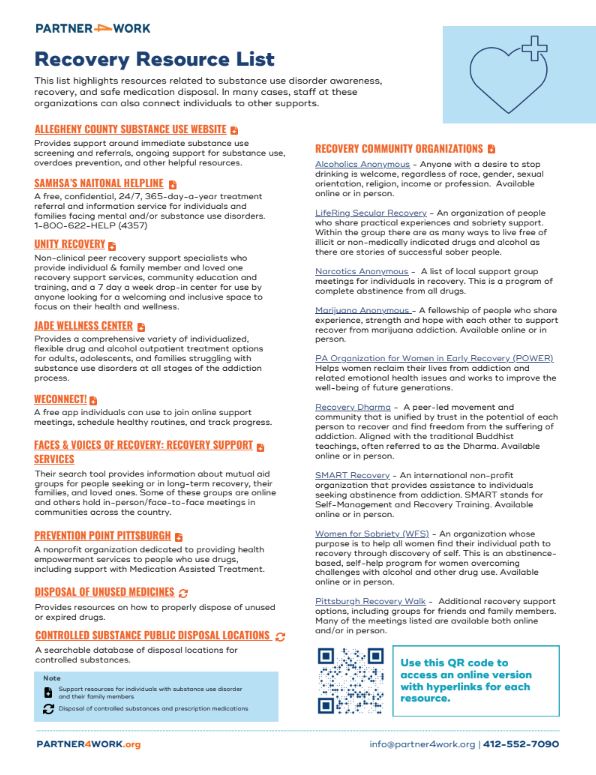 |
Reentry Supportive Workplaces
Mass incarceration has a staggering impact on local, state, and national workforce pipelines. On average, 1 in 4 Americans possess a criminal record6 and this untapped talent pool is often overlooked by employers. Individuals with criminal records experience a higher rate of unemployment than the general public and 75% of formerly incarcerated jobseekers are still unemployed a year after being released from prison or jail7.
Employers that create reentry supportive workplaces see the positive impact that justice-involved employees bring to their businesses. Research shows that reentrants are more productive, loyal to their employers, and bring new talent into the workplace8.
Learn more with our Reentry Supportive Workplaces Guide and promote person-centered language in your workplace. Click the images below to download.
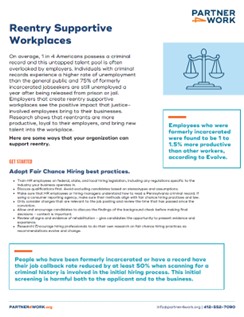 |
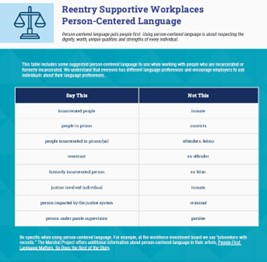 |
Partner4Work can support your efforts in implementing family, recovery, and reentry centered workplace practices. Contact Bonny Yeager, Sr. Manager of Industry Solutions at byeager@partner4work.org or 412-745-0269.
_____________________________________________________
References
-
- Aspen Institute, Statement on Good Jobs, 2022
- U.S. Department of Commerce, Job Quality Toolkit, 2022
- Great Place to Work, Maven, Parents at the Best Workplaces: The Largest-Ever Study of Working Parents, December 2020
- Recovree, Minnesota Recovery Friendly Workplace Toolkit, 2019
- SAMHSA, Evidence-based Resource Guide Series: Substance Use Disorders Recovery with a Focus on Employment and Education
- National Reentry Workforce Collaborative, FCH Employer Engagement Toolkit
- Legal Action Center, National H.I.R.E. Network
- National Employment Law Project, The Business Case: Becoming a Fair-Chance Employer, July 2016


